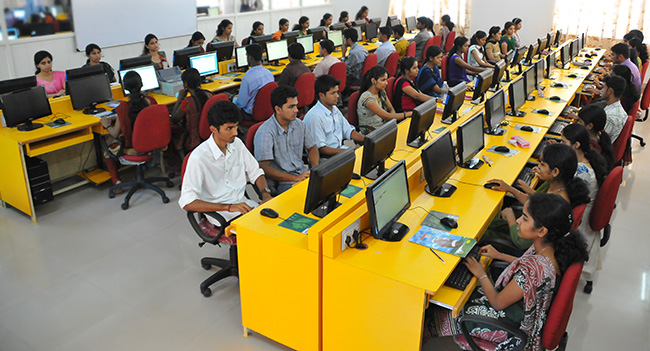

Courses Offered
- Mechanical Engineering
- Computer Science & Engineering
- Computer Science & Design
- Computer Science & Business System
- Artificial Intelligence and Machine Learning
- Information Science & Enginnering
- Aeronautical Engineering
- Electrical & Electronics Engineering
- Automobile Engineering
- Artificial Intelligence (AI) & Data Science (DS)
- Marine Engineering
- Electronics & Comm. Engineering
Duration of the Course:
4 Years (8 Semesters)
Eligibility:
A Pass in PUC (10+2) or its equivalent examination with 50% aggregate marks with Physics & Mathematics as compulsory subjects along with one of the following subjects – Chemistry, Bio-technology, Biology and the candidate shall have studied and passed in English as one of the subjects. In addition, candidates need to appear for any Entrance Exam conducted by State Govt/or recognized Consortium.
Why Engineering?
Engineers apply the principles of science and mathematics to develop economical solutions to technical problems. Their work is the link between scientific discoveries and the commercial applications that meet societal and consumer needs.
Many engineers develop new products. During the process, they consider several factors. For example, in developing an industrial robot, engineers specify the functional requirements precisely; design and test the robot’s components; integrate the components to produce the final design; and evaluate the design’s overall effectiveness, cost, reliability, and safety. This process applies to the development of many different products, such as chemicals, computers, powerplants, helicopters, and toys.
In addition to their involvement in design and development, many engineers work in testing, production, or maintenance. These engineers supervise production in factories, determine the causes of a component’s failure, and test manufactured products to maintain quality. They also estimate the time and cost required to complete projects. Supervisory engineers are responsible for major components or entire projects.
Engineers use computers extensively to produce and analyze designs; to simulate and test how a machine, structure, or system operates; to generate specifications for parts; to monitor the quality of products; and to control the efficiency of processes. Nanotechnology, which involves the creation of high-performance materials and components by integrating atoms and molecules, also is introducing entirely new principles to the design process.
Computer hardware engineers research, design, develop, test, and oversee the manufacture and installation of computer hardware, including computer chips, circuit boards, computer systems, and related equipment such as keyboards, routers, and printers.
Computer software engineers often simply called computer engineers—design and develop the software systems that control computers. These workers are covered elsewhere in the Handbook.) The work of computer hardware engineers is similar to that of electronics engineers in that they may design and test circuits and other electronic components; however, computer hardware engineers do that work only as it relates to computers and computer-related equipment. The rapid advances in computer technology are largely a result of the research, development, and design efforts of these engineers. Electronics engineers, except computer, are responsible for a wide range of technologies, from portable music players to global positioning systems (GPS), which can continuously provide the location of, for example, a vehicle.
Electronics engineers design, develop, test, and supervise the manufacture of electronic equipment such as broadcast and communications systems. Many electronics engineers also work in areas closely related to computers. However, engineers whose work is related exclusively to computer hardware are considered computer hardware engineers. Electronics engineers specialize in areas such as communications, signal processing, and control systems or have a specialty within one of these areas—control systems or aviation electronics, for example.
Mechanical engineers research, design, develop, manufacture, and test tools, engines, machines, and other mechanical devices. Mechanical engineering is one of the broadest engineering disciplines.
Engineers in this discipline work on power-producing machines such as electric generators, internal combustion engines, and steam and gas turbines. They also work on power-using machines such as refrigeration and air-conditioning equipment, machine tools, material-handling systems, elevators and escalators, industrial production equipment, and robots used in manufacturing. Some mechanical engineers design tools that other engineers need for their work. In addition, mechanical engineers work in manufacturing or agriculture production, maintenance, or technical sales; many become administrators or managers.
Most engineering programs involve a concentration of study in an engineering specialty, along with courses in both mathematics and the physical and life sciences. Many programs also include courses in general engineering. A design course, sometimes accompanied by a computer or laboratory class or both, is part of the curriculum of most programs. Often, general courses not directly related to engineering, such as those in the social sciences or humanities, also are required.
Overall job prospects Overall job opportunities in engineering are expected to be good, and, indeed, prospects will be excellent in certain specialties. In addition to openings from job growth, many openings will be created by the need to replace current engineers who retire; transfer to management, sales, or other occupations; or leave engineering for other reasons.







